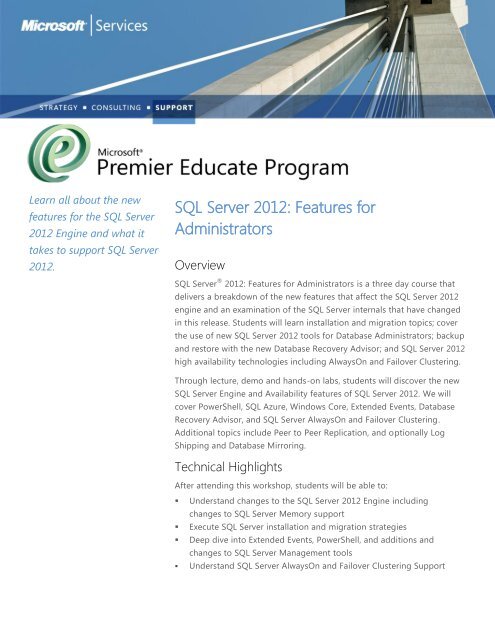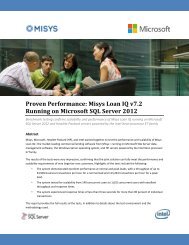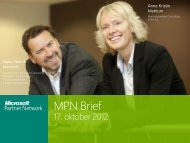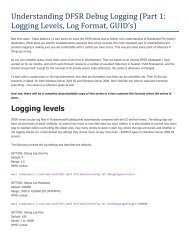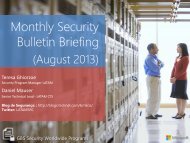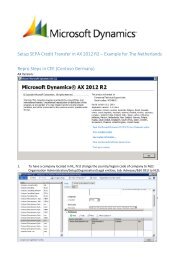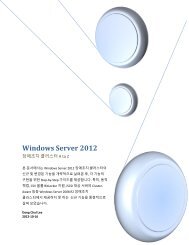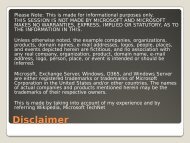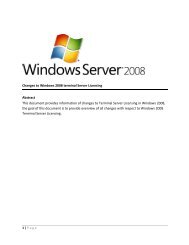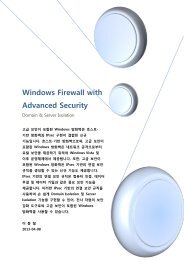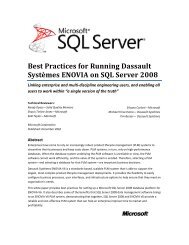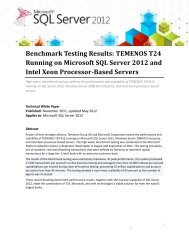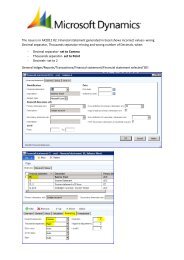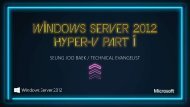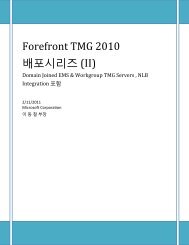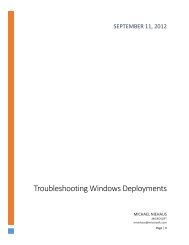SQL Server 2012: Features for Administrators - Microsoft
SQL Server 2012: Features for Administrators - Microsoft
SQL Server 2012: Features for Administrators - Microsoft
Create successful ePaper yourself
Turn your PDF publications into a flip-book with our unique Google optimized e-Paper software.
Learn all about the new<br />
features <strong>for</strong> the <strong>SQL</strong> <strong>Server</strong><br />
<strong>2012</strong> Engine and what it<br />
takes to support <strong>SQL</strong> <strong>Server</strong><br />
<strong>2012</strong>.<br />
<strong>SQL</strong> <strong>Server</strong> <strong>2012</strong>: <strong>Features</strong> <strong>for</strong><br />
<strong>Administrators</strong><br />
Overview<br />
<strong>SQL</strong> <strong>Server</strong> ® <strong>2012</strong>: <strong>Features</strong> <strong>for</strong> <strong>Administrators</strong> is a three day course that<br />
delivers a breakdown of the new features that affect the <strong>SQL</strong> <strong>Server</strong> <strong>2012</strong><br />
engine and an examination of the <strong>SQL</strong> <strong>Server</strong> internals that have changed<br />
in this release. Students will learn installation and migration topics; cover<br />
the use of new <strong>SQL</strong> <strong>Server</strong> <strong>2012</strong> tools <strong>for</strong> Database <strong>Administrators</strong>; backup<br />
and restore with the new Database Recovery Advisor; and <strong>SQL</strong> <strong>Server</strong> <strong>2012</strong><br />
high availability technologies including AlwaysOn and Failover Clustering.<br />
Through lecture, demo and hands-on labs, students will discover the new<br />
<strong>SQL</strong> <strong>Server</strong> Engine and Availability features of <strong>SQL</strong> <strong>Server</strong> <strong>2012</strong>. We will<br />
cover PowerShell, <strong>SQL</strong> Azure, Windows Core, Extended Events, Database<br />
Recovery Advisor, and <strong>SQL</strong> <strong>Server</strong> AlwaysOn and Failover Clustering.<br />
Additional topics include Peer to Peer Replication, and optionally Log<br />
Shipping and Database Mirroring.<br />
Technical Highlights<br />
After attending this workshop, students will be able to:<br />
• Understand changes to the <strong>SQL</strong> <strong>Server</strong> <strong>2012</strong> Engine including<br />
changes to <strong>SQL</strong> <strong>Server</strong> Memory support<br />
• Execute <strong>SQL</strong> <strong>Server</strong> installation and migration strategies<br />
• Deep dive into Extended Events, PowerShell, and additions and<br />
changes to <strong>SQL</strong> <strong>Server</strong> Management tools<br />
• Understand <strong>SQL</strong> <strong>Server</strong> AlwaysOn and Failover Clustering Support
Target Audience<br />
To ensure the high-quality knowledge-transfer expected<br />
by attendees of this three day workshop, class size is<br />
limited to a maximum of 16 students who meet the<br />
following criteria:<br />
• Minimum of 2-3 years’ experience with <strong>SQL</strong> <strong>Server</strong><br />
(any version)<br />
• Job titles such as:<br />
• Database <strong>Administrators</strong><br />
• Database Support Engineers<br />
• Database Architects<br />
• Systems <strong>Administrators</strong><br />
Classroom Requirements<br />
To participate in the course, students need to have<br />
access to a workstation that meets or exceeds the<br />
minimum hardware and software requirements listed<br />
below. If you are attending an open enrollment<br />
workshop, a workstation will be provided <strong>for</strong> you.<br />
• Windows <strong>Server</strong> 2008R2<br />
• 6 gigabytes (GB) of RAM<br />
• Minimum of 120-GB hard disk space<br />
• Super VGA (SVGA) monitor (17 inch) or better<br />
• 16-megabyte (MB) video adapter (32 MB<br />
recommended)<br />
Syllabus<br />
This workshop runs a full three days. Students should<br />
anticipate consistent start and end times <strong>for</strong> each day.<br />
Early departure on any day is not recommended.<br />
Module 1: <strong>SQL</strong> <strong>Server</strong> Internals and Foundation<br />
Technologies<br />
features and engine internals such as memory<br />
management with a focus on the role of the Database<br />
Administrator.<br />
Lesson 1 - Introduction and Overview<br />
Lesson 2 - Windows <strong>Server</strong> Core Support<br />
Lesson 3 - <strong>SQL</strong> AZURE<br />
Module 2: Preparing <strong>SQL</strong> <strong>Server</strong> Installation and<br />
Migration<br />
This module details the techniques used to install <strong>SQL</strong><br />
<strong>Server</strong> <strong>2012</strong> via the command line, deprecated<br />
features, upgrade and migration techniques, and using<br />
the Upgrade Advisor.<br />
Lesson 4 - Deprecated and Discontinued <strong>SQL</strong><br />
<strong>Server</strong> <strong>Features</strong><br />
Lesson 5 - Preparing to Install <strong>SQL</strong> <strong>Server</strong> <strong>2012</strong><br />
Lesson 6 - Installation Techniques using the<br />
Command Prompt<br />
Lesson 7 - Upgrade and Migration Overview<br />
Lesson 8 - Leveraging the MAP Toolkit 6.5 and <strong>SQL</strong><br />
<strong>Server</strong> Upgrade Advisor<br />
Lesson 9 - Post Installation Ef<strong>for</strong>ts <strong>for</strong> <strong>SQL</strong> <strong>Server</strong><br />
<strong>2012</strong><br />
Module 3: <strong>SQL</strong> <strong>Server</strong> Management and<br />
Developer Tools<br />
This module describes the changes to <strong>SQL</strong> <strong>Server</strong><br />
Management Studio and the support <strong>for</strong> Extended<br />
Events, PowerShell, and other extended tools such as<br />
Distributed Replay.<br />
Lesson 10 - <strong>SQL</strong> <strong>Server</strong> Management Studio /<br />
Developers Tools<br />
Lesson 11 - Extended Events<br />
Lesson 12 - PowerShell and WMI<br />
Lesson 13 - Distributed Replay<br />
This module provides an overview of <strong>SQL</strong> <strong>Server</strong> <strong>2012</strong><br />
This data sheet is <strong>for</strong> in<strong>for</strong>mational purposes only. MICROSOFT MAKES NO WARRANTIES, EXPRESS OR IMPLIED,<br />
IN THIS SUMMARY.
Module 4: <strong>SQL</strong> <strong>Server</strong> Backup / Restore and<br />
Availability Technologies<br />
This module covers Backup and Restore techniques, the<br />
use of the new Database Recovery Advisor, AlwaysOn<br />
and Failover Clustering support, and Contained<br />
Databases. We will additionally cover <strong>SQL</strong> <strong>Server</strong><br />
Replication and optionally Database Mirroring and<br />
Database Snapshots as well as Log Shipping.<br />
Lesson 14 - Database Backup, Restore, and<br />
Compression<br />
Lesson 15 - Database Recovery Advisor<br />
Lesson 16 - Failover Clustering<br />
Lesson 17 - <strong>SQL</strong> <strong>Server</strong> AlwaysOn<br />
Lesson 18 - Contained Database Authentication<br />
Lesson 19 - <strong>SQL</strong> <strong>Server</strong> Replication<br />
OPTIONAL:<br />
Lesson 20 - Database Mirroring and Database<br />
Snapshots<br />
Lesson 21 - Log Shipping<br />
This data sheet is <strong>for</strong> in<strong>for</strong>mational purposes only. MICROSOFT MAKES NO WARRANTIES, EXPRESS OR IMPLIED,<br />
IN THIS SUMMARY.


